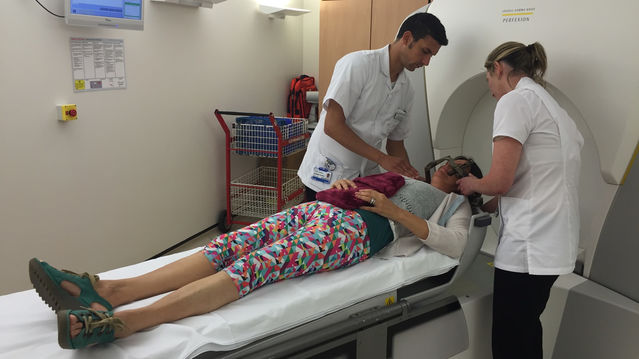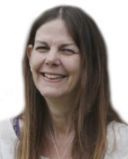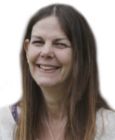At the end of last month, on the same day that I heard that my dear friend, Annie Wegelius, died from breast cancer, I got my latest scan results. Two months ago, I couldn't walk a few feet without assistance and I didn’t think I would make this Christmas. I had been living with multiple brain tumors for eight months and for the third time in as many years. My treatment options were extremely limited and I was planning my funeral.
Today I am virtually symptom-free. My oncologist was innovative enough to put me on a drug that I don’t technically qualify for and doubled the dose to blast it into my brain*. The scan showed “a striking improvement”, with most tumors disappearing. Three remain after significant shrinkage (now no more than 6mm) – including the big bugger (is that very British?!) that made me lose my balance. If I turned my head from side to side, I would either vomit or fall over, which went on for weeks. I am back from the brink again.

I am not cured and I don’t know how long this will last. These drugs have a limited shelf life. But even my oncologist was almost skipping with joy. He took a risk for me and it paid off. Moreover, I am 95 percent tumor free in the rest of my body. The primary in my lung is still there, but it is very small and appears to have shrunk a bit more as well. So, having been told that whole brain radiation was my only option, I have been granted a significant reprieve. I am beyond grateful: to my oncologist, who treats me like a partner not a patient; to the person who generously paid for the first two cycles of this drug and saw me as a worthy investment; to my husband, for everything; and to That Which Is, for opening a door that seemed so likely to close.
This news wasn’t overshadowed by Annie’s death, but a shadow was certainly cast. We were close. I had only known her for two years, but kindred spirits with cancer don’t waste time or love. She was a pioneering TV producer in Sweden who contacted me when she read my book. It was one of those letters that shone with affinity. I responded immediately.
During our short but intense friendship, she attended one of my cancer whispering workshops, I stayed with her in France (where I started my second book), we Skyped regularly and hatched some grand plans about how to change the world (as if we would both live forever). She taught me how to be fierce about the things I still want to do with my life. I taught her how to be vulnerable and how to pray. She lived with cancer for eight remarkable years. In recent months, I was privy to her fear of dying and her grief about leaving her fourteen-year-old daughter. But on our last call, just two weeks before her passing, I witnessed her at peace. It was hard not to gasp with shock when I saw how thin she was, but her eyes were gleaming and her face was so serene she looked 10 years younger as if the lines had been ironed out. It was stunning. It was how I want to be when I go.
When my oncologist told me my scan results, I welled up with tears: for Annie and for myself. We had no childcare that day so my seven-year-old daughter, Gabriella, was doing coloring in the reception area with my oncologist’s assistant while John and I read the radiologist’s report. She kept running in and jumping onto the exam table, pretending to be a patient. It was the first time we had taken her there. John and I had gone back and forth about it for a couple of days because he could have stayed at home with her, but Annie’s death tipped the decision. I did not want to go alone. Gabriella’s presence on this occasion was perfectly designed. I had just been given more time with her. For me, this is the definition of grace.
On the same day, my 83-year-old dad was in the hospital having a new tumor surgically removed from his right shoulder. Like me, he has lung cancer and is pioneering new ways to stick around when many would just write him off. I spoke to my mother that evening and heard it had all gone well. She describes herself as being “in the middle of a cancer sandwich," so there was relief for her all around.
It’s a strange thing living close to death—my own and other people’s. Annie is not my first loss since I was diagnosed, but she is my greatest. When you love people with cancer, you need to be ready to lose them, but it never gets any easier. At the same time, everything that matters most is thrown into relief and commands your attention. Grief is just seconds beneath the skin. Gratitude sparkles like water in moonlight. Life’s mercies crunch underfoot.
There are more bridges to cross, like how to continue receiving a drug I don’t qualify for under the UK license and how to adjust to its side effects, the latest of which is a very infected toe (temporarily benching me again). But these matters are small. Sometimes it is enough to stop on the other side of the bridge we’ve just crossed and take in the view. It is enough to notice that on the day I lost my friend and gained more time with my family, sadness and joy amplified my heart in equal measure while bitter and sweet tasted exactly the same.
References
*For those who are interested, the drug is Osimertinib. It is for lung cancer patients with the EGFR and T790M mutations, but I tested negative for T790M. This is why I don’t qualify for it, but there is increasing evidence of its brain penetration and the process is under way for making it a first line treatment in the UK. This has just recently been approved by the FDA in the US.


